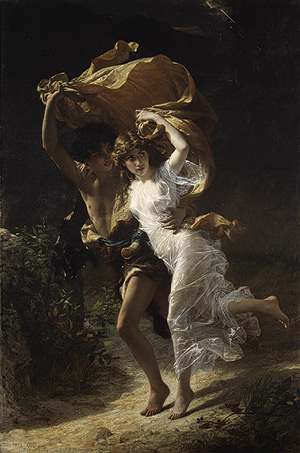
"The Storm"
Pierre-Auguste Cot, oil on canvas, 1880
Metropolitan Museum of Art, New York, New York
According to a note in a collection of Cordwainer Smith stories, that painting is the inspiration of a scene in Alpha Ralpha Boulevard 1 That's likely enough.
Where Do They Get Those Ideas?
I don't think that there's some mystic way that writers get their ideas. I do think that there may be as many ways to get ideas as there are writers: but that they can be put into a manageable number of categories.This isn't going to be a exhaustive list, but it might help suggest ways to shake story ideas loose.
Visual Art
According to J. J. Pierce, one scene in a Cordwainer Smith story was inspired by that painting. Paintings, photographs, any sort of visual art - representational or not - could suggest a scene or setting or maybe an entire story.The work at right, by a Chinese artist, has a very specific history (and poem) that goes with it - but might suggest a thousand others.
These examples are fairly representational, but I think that contemplating abstract or other 'unrealistic' work might pry an idea or two loose from your mind.
The News
Good news: What you get in the news are the stories that editors decided might be interesting enough to grab the attention of their readers. You don't have to wonder quite so much, whether or not people would find the situation interesting.Bad news: these are (with a few embarrassing exceptions) factual accounts of what happened to real people. If you don't change the situation enough, you could be in legal trouble. Besides, someone's going to catch on - and 'pop' goes your credibility as a writer. My opinion.
Other Stories
Same comments.Booze, Drugs, Severe Head Injury
Interestingly, I'm not aware of anybody romanticizing severe head trauma as a means of artistic release: although it would involve the same principle of boozing or 'expanding your consciousness' with drugs. The human brain, when damaged or impared, can do very strange things to a person's perceptions.A word of advice, for anyone thinking of re-enacting the sixties: Don't
Sure, after a few beers you may think you're unusually poetic and creative - as well as being exceptionally athletic and attractive. Anyone who's been in a bar before closing time - sober - could confirm that subjective awareness and objective reality aren't necessarily on the same page.
Like the guy at the bar. He'd down a drink, open his wallet and look in it, and order another drink. After a while the bartender asked him what he was doing. The guy showed the bartender a photo of his mother-in-law and said, "when she starts looking good, I've had enough."
Which leads, sort of, into another source for story ideas.
Actually, it's the only source.
Story Ideas: They're All in Your Head
Every method I've suggested - including reading the news - draws on the same source for story ideas. Your own memory and associations you've made between events and ideas.It's a matter of learning how to get at the storehouse of imagery, events, experiences, and ideas that's already in your head. There, you're on your own.
I don't have much trouble getting images and associations released from whatever psychobabble for 'the unconscious' is these days. All I have to do is release the brake, and enjoy the ride. My problem is making sense of what goes past. One of my blogs, Narcissus-X is a pretty good reflection of the more conventionally 'artistic' content I collect that way.
Although there's more of that angsty artist in me than I like, that's not the sort of stuff I want to produce.
Getting Ideas is One Thing - - -
Finally, there's more to writing than nifty ideas. As I mentioned in a few days ago, written stories are over four thousand years old: and there's excellent reason to think that story-telling goes much further back than than. I suppose it's possible that there's a basic idea for a story that hasn't been used yet: but it's very, very unlikely.So, I wouldn't worry too much about getting an 'original' idea. The trick is to find an idea that works for a story - and weaving a new narrative around it. (No, I didn't come up with that idea either.)
1Page 259, "The Best of Cordwainer Smith"
Edited, with Introduction and Notes, by J. J. Pierce © 1975 Nelson Doubleday, Inc., Garden City, New York
More-or-less related posts, from Apathetic Lemming of the North:
- "Plotting a Novel - Like a Snowflake?!"
(February 10, 2009) - "More Writing Prompts"
(January 31, 2009) - "Waiting for the Muse, Getting the Club: Two Approaches to Inspiration"
(January 13, 2009) - "Attack of the Killer Rabbits: Attention, Writers!"
(August 16, 2008) - "Writing: Fiction, Mostly"
(July 1, 2008)- List of links to micro-reviews about handling character, plot and style: updated sporadically
No comments:
Post a Comment
Thanks for your comment!